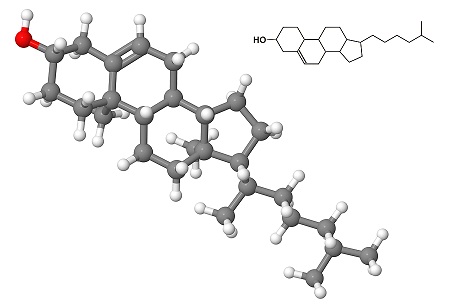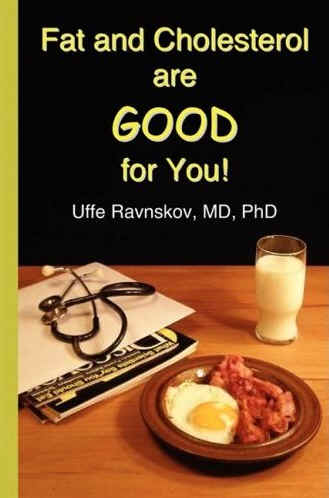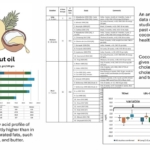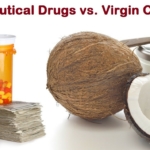
Cholesterol Molecule
Health Impact News Editor Comments: The National Heart, Lung and Blood Institute will soon be updating their recommendations for “healthy” cholesterol numbers. A panel of “experts” has not revised the number since 2004, when they lowered the recommended LDL target from below 100 to below 70. Two years earlier in 2002, the recommended number was lowered from 130 to 100.
As a result of continuously lowering these numbers, sales of cholesterol lowering drugs skyrocketed, becoming the best-selling class of drug in the United States and worldwide through 2007. The top drug, Lipitor, hit sales of over 14 billion dollars in 2006, propelling Pfizer to the top of the pharmaceutical empire. For years they had no serious competitors in sales (of ANY class of drug), outselling the next best-selling drugs by more than 2 to 1! Pfizer’s patent on Lipitor, the best-selling drug of all-time by far, expired at the end of 2011. Shortly after that, the FDA issued new warnings about statin drugs in 2012, which included known side effects such as diabetes and memory loss.
The journal Nature is reporting, however, that there are rumblings about the cholesterol numbers not being so meaningful, and that they may be revised this time around when the “experts” get together. The panel making the decisions about cholesterol guidelines is The Adult Treatment Panel (ATP) of the National Heart, Lung and Blood Institute. Even though statin drugs have been documented with well over 300 side effects, and reportedly create 60,000 new diabetics a year, one of every four Americans over the age of 55 is currently taking prescription statin drugs. Since the panel members of the ATP are all medical doctors (you can find their names here), I seriously doubt there will be any significant changes to their cholesterol guidelines that would harm the pharmaceutical industry. Our tax dollars, flowing through the National Institute of Health into the National Heart, Lung and Blood institute is already funding research on new cholesterol drugs, as can be seen by this recent press report. There is even research in progress to develop a new vaccine to lower cholesterol. If word gets out to the general public that cholesterol is necessary for health, is a major component of our brains (the lack of cholesterol may be causing Alzheimer’s), and has no scientific relationship to causing heart disease, the pharmaceutical industry will take a huge loss.
Cholesterol limits lose their lustre
Excerpts:
For the first time in more than a decade, the US National Heart, Lung and Blood Institute is revising the clinical guidelines that shaped Francis’s treatment. Expected to be released later this year, the fourth set of guidelines, called ATP IV, has been drawn up by an expert panel of 15 cardiologists appointed by the institute. The guidelines will set the tone for clinical practice in the United States and beyond, and will profoundly influence pharmaceutical markets. They will also reflect the growing debate over cholesterol targets, which have never been directly tested in clinical trials.
In 2011, US doctors wrote nearly 250 million prescriptions for cholesterol-lowering drugs, creating a US$18.5-billion market, according to IMS Health, a health-care technology and information company based in Danbury, Connecticut. “The drug industry in particular is very much in favour of target-based measures,” says Joseph Drozda, a cardiologist and director of outcomes research at Mercy Health in Chesterfield, Missouri. “It drives the use of products.”
Jay Cohn, a cardiologist at the University of Minnesota Medical School in Minneapolis, also worries that the focus on LDL levels offers up the wrong patients for statin therapy. Most of those who have a heart attack do not have high LDL, he notes. Cohn advocates treating patients with statins based on the state of health of their arteries, as revealed by noninvasive tests such as ultrasound. “If your arteries and heart are healthy, I don’t care what your LDL or blood pressure is,” he says.
Read the Full Article Here: http://www.nature.com/news/cholesterol-limits-lose-their-lustre-1.12509




 How the Simple High-Fat Low-Carb Ketogenic Diet Continues to Change People's Lives
How the Simple High-Fat Low-Carb Ketogenic Diet Continues to Change People's Lives New Studies Continue to Show that Coconut Oil is the Best Oil for Treating Skin Conditions and Maintaining Healthy Skin and Teeth
New Studies Continue to Show that Coconut Oil is the Best Oil for Treating Skin Conditions and Maintaining Healthy Skin and Teeth New Study Confirms Health Benefits of Coconut Oil and USDA False Claims Against It
New Study Confirms Health Benefits of Coconut Oil and USDA False Claims Against It The FDA has NOT Banned Trans Fats! Traditional Saturated Fats like Coconut Oil Continue to Shine for Alzheimer's Disease but are Condemned by U.S. Dietary Advice
The FDA has NOT Banned Trans Fats! Traditional Saturated Fats like Coconut Oil Continue to Shine for Alzheimer's Disease but are Condemned by U.S. Dietary Advice The Evidence of Coconut Oil's Superiority Over Drugs in Destroying Pathogens Continues to be Published in Peer-Reviewed Journals
The Evidence of Coconut Oil's Superiority Over Drugs in Destroying Pathogens Continues to be Published in Peer-Reviewed Journals